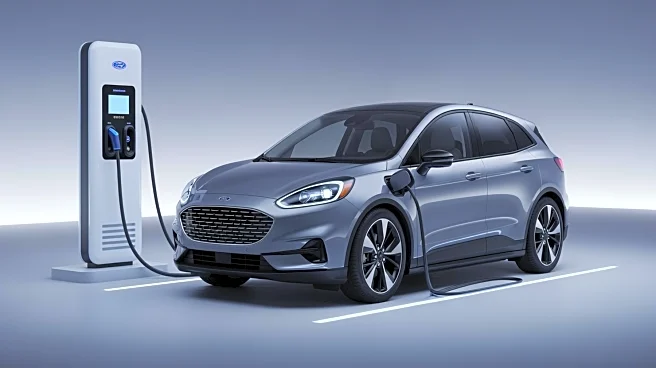What's Happening?
Ford's electric vehicle sales, including the Mustang Mach-E and F-150 Lightning, have not experienced the dramatic decline seen by other brands following the end of the US EV tax credit. While there was
a decrease in sales compared to previous months, the drop was not as severe as anticipated. The Mustang Mach-E recorded 2,906 sales, down from 3,313 in October 2024 and 7,643 in September 2025. Similarly, the F-150 Lightning saw 1,543 sales, a decrease from 1,863 in October 2024 and 3,957 in September 2025. The E-Transit model, however, experienced a significant drop, with only 260 sales compared to 1,088 in October 2024. Despite these figures, Ford's electric models have shown resilience, maintaining sales levels close to those of October 2024.
Why It's Important?
The ability of Ford's electric vehicles to maintain relatively stable sales amidst the expiration of the US EV tax credit is significant for the automotive industry. It suggests that consumer interest in Ford's electric models remains strong, potentially due to brand loyalty or the appeal of specific models like the Mustang Mach-E and F-150 Lightning. This stability could provide Ford with a competitive edge as other manufacturers, such as Hyundai and Kia, face more substantial declines. The situation highlights the importance of brand strength and product appeal in sustaining sales during policy shifts. Ford's decision to decrease EV production capacity due to dropping demand may need reevaluation if sales figures continue to show resilience.
What's Next?
Ford may consider revising its strategy regarding EV production capacity in light of the relatively stable sales figures. The company could focus on marketing efforts to boost consumer interest and capitalize on the resilience of its electric models. Additionally, Ford might explore incentives or promotions to further stimulate sales and offset the impact of the tax credit expiration. Monitoring consumer trends and adjusting production plans accordingly will be crucial for Ford to maintain its position in the competitive EV market.
Beyond the Headlines
The broader implications of Ford's sales performance could influence industry perceptions of electric vehicle viability post-tax credit. If Ford successfully navigates this transition, it may set a precedent for other manufacturers facing similar challenges. The situation also underscores the potential for electric vehicles to sustain market presence through brand strength and model appeal, even in the absence of financial incentives.












